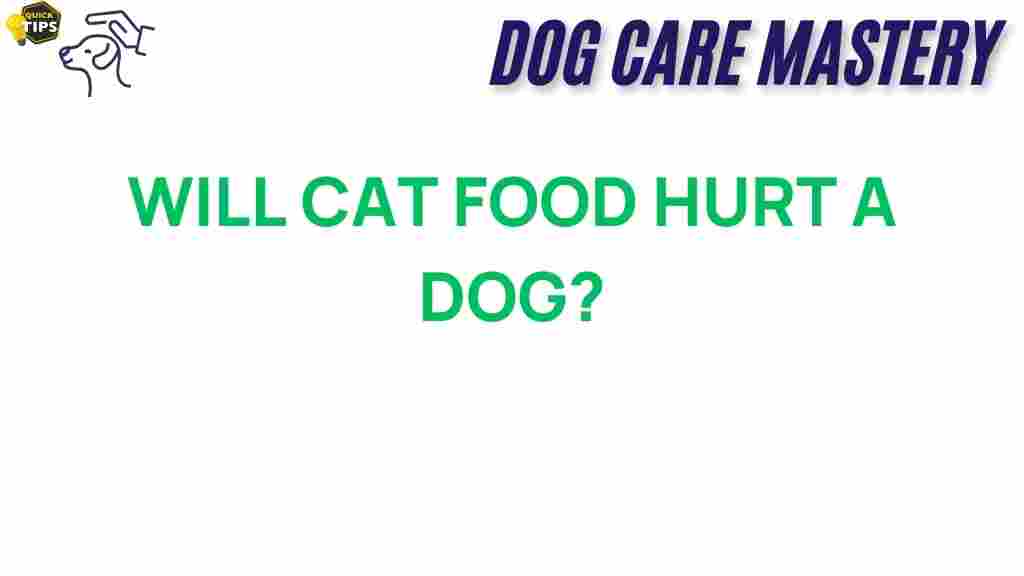The Surprising Truth: Will Cat Food Hurt a Dog?
As pet owners, we often find ourselves questioning what our furry friends can and cannot eat. Among the many concerns is whether cat food is harmful to dogs. With its appealing aromas and enticing textures, it’s not uncommon for dogs to sneak a bite of cat food when given the opportunity. But is it safe? In this article, we will explore the surprising truth about cat food and its potential effects on our canine companions.
Understanding Cat Food
Before delving into the implications of dogs consuming cat food, it’s essential to understand what cat food is made of. Cat food is specifically formulated to meet the nutritional needs of felines, which differ significantly from those of dogs. Here are some key components:
- High Protein Content: Cat food typically has a higher protein level, as cats are obligate carnivores.
- Fat Levels: The fat content in cat food is generally higher, providing the energy that cats need.
- Taurine: This amino acid is vital for cats but is not necessary for dogs, as dogs can produce it on their own.
Will Cat Food Hurt a Dog?
The short answer is: it depends. While a small amount of cat food may not cause immediate harm to a dog, it is not advisable as a regular part of their diet. Here’s why:
- Digestive Issues: Dogs may experience gastrointestinal upset like vomiting or diarrhea after eating cat food due to its rich composition.
- Nutritional Imbalance: Regular consumption of cat food can lead to obesity and nutritional imbalances in dogs, as they require a different ratio of nutrients.
- Potential Toxicity: While not common, some dogs may have allergies or intolerances to ingredients found in cat food.
The Risks of Cat Food Consumption
While occasional snacking on cat food may not be life-threatening, it can pose several risks for dogs. Here’s a closer look at some potential consequences:
1. Gastrointestinal Distress
Dogs that consume cat food can experience upset stomachs. Symptoms may include:
- Vomiting
- Diarrhea
- Abdominal pain
2. Weight Gain and Obesity
Due to the high fat and protein content, regular consumption of cat food can lead to weight gain in dogs. Being overweight can result in additional health problems such as:
- Joint issues
- Diabetes
- Heart disease
3. Nutritional Deficiencies
Dogs require a balanced diet that includes specific nutrients like certain vitamins and minerals. Relying on cat food can lead to deficiencies over time.
What Should You Do If Your Dog Eats Cat Food?
If you discover that your dog has indulged in cat food, here are the steps you should take:
Step 1: Assess the Situation
Monitor your dog for any signs of discomfort or distress. If your dog has only had a small amount, it may not be cause for alarm.
Step 2: Check for Symptoms
Keep an eye out for the following:
- Vomiting
- Diarrhea
- Lethargy
Step 3: Contact Your Veterinarian
If your dog exhibits severe symptoms or if you’re concerned, reach out to your veterinarian for advice. They can provide guidance based on your dog’s health history and the amount of cat food consumed.
Preventing Cat Food Sneak-Attacks
To prevent your dog from snacking on cat food, consider the following tips:
- Feed Pets Separately: Create designated feeding areas for your cat and dog to avoid cross-contamination.
- Store Cat Food Securely: Keep cat food in a place that is inaccessible to dogs.
- Train Your Dog: Teach commands such as “leave it” to discourage your dog from eating cat food.
Common Misconceptions About Cat Food and Dogs
There are several myths surrounding the consumption of cat food by dogs. Here are a few misconceptions debunked:
- Myth 1: “All dog food is the same as cat food.”
- Myth 2: “Cats and dogs can share the same diet.”
- Myth 3: “Cat food is a good treat for dogs.”
Alternative Diet Options for Dogs
If you’re looking for safe and nutritious alternatives for your dog, consider these options:
- Commercial Dog Food: Choose high-quality dog food designed for your dog’s specific needs.
- Homemade Meals: Consult your vet for recipes that ensure a balanced diet.
- Dog Treats: Offer treats that are specifically formulated for dogs.
Conclusion
In summary, while cat food may not immediately hurt a dog, it is not advisable for regular consumption due to its rich nutritional profile, which is not suited for canine digestive systems. Occasional snacking might not be harmful, but it can lead to digestive issues, weight gain, and nutrient imbalances over time. Always keep an eye on your furry friends and consult your veterinarian if any health concerns arise.
For more information about pet diets, check out this comprehensive guide. And remember, a balanced diet is vital for your pet’s health!
Are you interested in learning more about pet care? Visit our pet care blog for tips and tricks!
This article is in the category Nutrition and created by dogcaremastery Team
